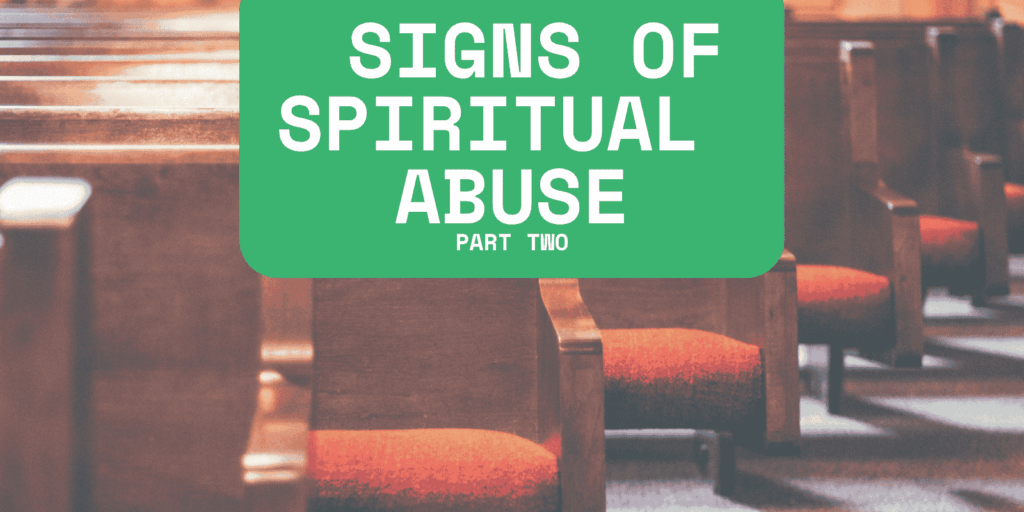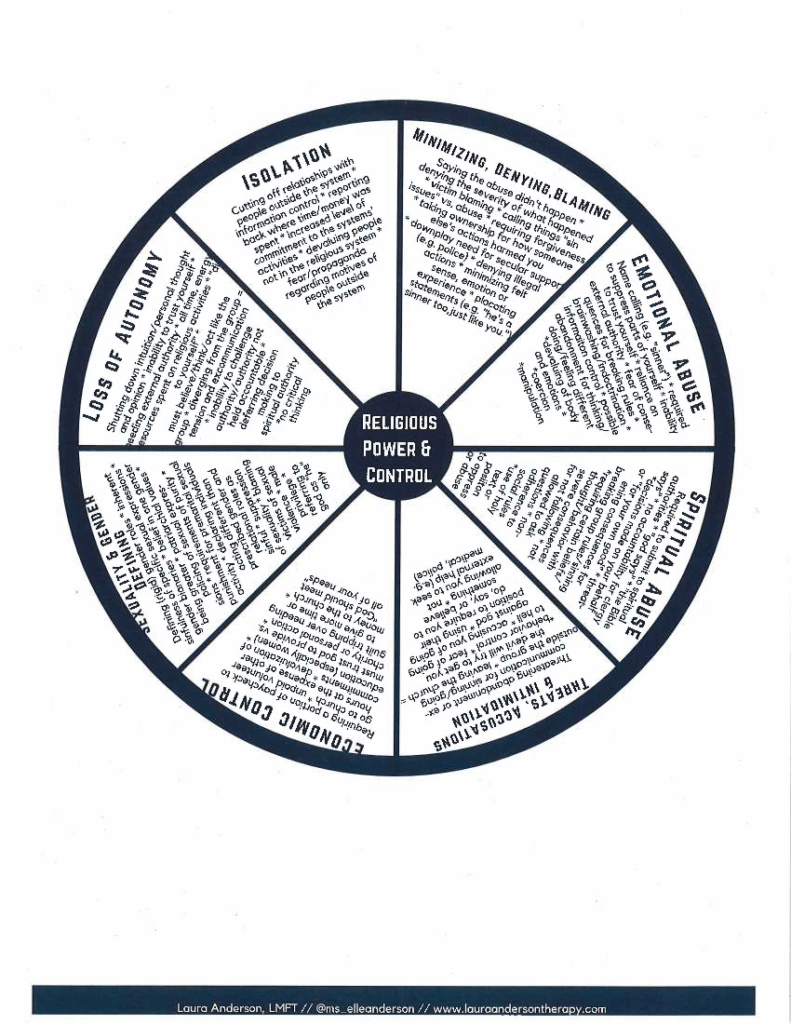
Signs of Spiritual Abuse—Part Two
To read the first part of this series, click here.
Minimizing, Controlling, and Suppressing the Self in High-Control Religious Groups
In part one, I introduced the Religious Power & Control Wheel—a framework developed by the Religious Trauma Institute to help identify signs of spiritual abuse in high-control religious groups. While Part One covered coercion, intimidation, emotional abuse, and isolation, this second installment explores four more forms of control that often show up in religious or spiritual abuse.
If you’ve ever felt like your thoughts, feelings, or identity were unwelcome in your religious environment—or that questioning authority meant risking everything—this might help you name your experience.
5. Minimizing, Denying, and Blaming 🪞
This form of abuse often shows up in spiritual bypassing—a way of using religious language to dismiss or avoid emotional truth. You may have heard phrases like:
- “Everything happens for a reason.”
- “The Lord works in mysterious ways.”
- “Let go and let God.”
These statements may sound comforting on the surface, but they can also be used to shut down valid emotions or deny harm. When someone is told they’re “straying” for questioning doctrine or “not faithful enough” if prayers go unanswered, it invalidates their experience and adds shame to their pain.
Other examples of minimizing and blaming:
- Gaslighting: “That didn’t happen,” or “You’re being dramatic.”
- Victim blaming: “Did you bring this on yourself by sinning?”
- Required forgiveness: “You must forgive, no matter what happened—it’s the godly thing to do.”
These tactics can lead individuals to believe, “If I were just more faithful, I wouldn’t be suffering,” making it difficult to hold abusers accountable or even name abuse for what it is.
6. Loss of Autonomy 🔒
A core characteristic of spiritual abuse is the erasure of personal agency. In high-control religious environments, critical thinking, gut instincts, and emotional intuition are often suppressed or shamed.
Common signs:
- Members are taught to distrust their own thoughts and emotions.
- Group leaders or religious texts are treated as the only source of truth.
- Individuals are discouraged from making major decisions (e.g., marriage, career, parenting) without group or elder approval.
Some groups enforce this control through:
- “Accountability groups” or confession sessions where privacy is stripped
- Forced sharing of personal information or “collateral” that can be used against you
- Dependence on the group for financial support, social life, or even housing
Over time, this creates a deep-seated belief: “I can’t trust myself. I need others to tell me what’s right.” For those leaving a high-control group, even basic decisions can feel overwhelming and anxiety-inducing.
7. Control of Gender and Sexuality ⚥
Rigid gender roles are common in high-control religions. These roles are often:
- Binary and traditional (e.g., men lead, women submit)
- Strictly enforced, with punishment or shame for deviation
- Used to justify subjugation, especially of women and queer individuals
Queer and gender-diverse identities are frequently pathologized or demonized. You might hear things like:
- “The gay agenda is corrupting our children.”
- “God made you a woman, and your role is to serve your husband.”
- “Same-sex attraction is a temptation to overcome.”
This kind of messaging deeply harms self-worth and can lead to depression, anxiety, and identity suppression.
8. Economic Control 💰
In many high-control religious environments, financial control is another tool of power. It may show up in ways like:
- Required tithes or offerings (e.g., “Give 10% of your income or you’re disobeying God”)
- Group-wide sharing of finances disguised as mentorship
- Shame or punishment for “worldly” spending or earning
- Discouragement—especially for women—from pursuing careers or higher education
Material success outside the group may be frowned upon. Members who express desire for life beyond the group may be labeled as disobedient or lacking faith.
Naming Abuse, Finding Freedom 🌱
Recognizing spiritual abuse can be incredibly difficult—especially if you’re still part of a group or have close ties to people who are. Denial and fear are normal, especially when leaving means losing your community, identity, or sense of purpose.
Let’s be clear: religion itself is not the problem. Many people find healing, hope, and meaning in their faith. But when religion is used as a tool of control, harm, or suppression, it becomes something else entirely.If you or someone you care about sees these patterns in a spiritual or religious context, consider reaching out to a licensed therapist, especially one who understands religious trauma. You deserve support—and you deserve to live a life where your thoughts, feelings, identity, and choices are honored.
Loss of Autonomy
This may be one of the hallmark signs of religious power and control. Within these groups, there is an overall suppression of intuition and critical thinking skills. A member’s intuition may tell them that what is happening within the group is unhealthy. However, the group continues to maintain its point, leading to the members’ only options being to suppress their emotions and urges or leave. Often, the group members see themselves as enlightened. Because they are enlightened, they are above their sensations and emotional experiences and receive all their messages from elders or the divine, thereby not utilizing critical thinking skills. There is an over-reliance on the group for emotional support, social engagements, and finances. There is also a denial of privacy through accountability groups, audits, “giving collateral,” or other tactics. In these activities, members are made to give out personal information to be used against them. Overall, there is a submission to authority and a learned belief that the member is not an authority over themselves and that they must default to other members or divine authority to make significant life decisions. This can leave individuals who are thinking about leaving or who have left a high-control religion feeling indecisive and anxious about everyday life decisions.
Definition of Gender and Sexuality
In high-control religions and other groups, there are often rigid and binary gender roles. If members don’t fit into these roles perfectly, they are shamed, punished, or excluded from the group. Often, women are the recipients of subjugation, and there are strict limits around sex and marriage. In addition, there is a pathologizing of queer identities. These groups may use propaganda such as “The Gay Agenda” to make others afraid of gay people.
Economic control
Financial investment requirements, such as offerings, tidings, or giving up a percentage of one’s salary to the group, feel required, not optional. Members may make interpretations about big financial wins within the group (i.e., “We prayed for this!). Also seen are restricted education and employment opportunities, mainly for women. Working outside the home may be seen as “bad” or against the will of God. Members may also shame others for “worldliness,” or enjoying things outside of the group. Often, members who want something outside the group are seen as lesser than others. In some groups, members are required to share their finances under the guise of mentorship when it is about control.
The wheel outlines signs of spiritual abuse that can be seen in high-control religions and other groups high-control groups. These signs of abuse can be difficult for individuals who have been abused to realize, especially if they are still involved with the group. Denial and fear are everyday experiences of members on the fence about leaving their faith.
Remember that religion in itself is not bad and that religious institutions have helped many people live peaceful and happy lives. However, if someone you know or yourself notices some of the patterns listed above within their religious group, please consider meeting with a licensed therapist to speak more about it.


Shelby Milhoan, LCPC
